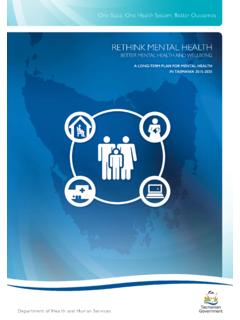Transcription of The ten essential shared capabilities - Progress
1 shared capabilities A framework for the Whole of the The Ten essential mental health Workforce national Institute for mental health in England Developed by the national Institute for mental health England and the Sainsbury Centre for mental health Joint Workforce Support Unit in conjunction with NHSU The Ten essential shared capabilities A framework for the Whole of the mental health Workforce READER INFORMATION Policy Estates HR/Workforce Performance Management IM & T Planning Finance Clinical Partnership Working Document Purpose Best Practice Guidance ROCR Ref: Gateway Ref: 3453 Title The Ten essential shared capabilities A framework for the whole of the mental health Workforce Author Roslyn Hope, Director, national Workforce Programme, NIMHE Publication date August 2004 Target Audience PCT CEs, NHS Trusts CEs, SHA CEs, Care Trusts CEs, WDC CEs, Medical Directors, Directors of Nursing, Special HA CEs, Directors of HR, Allied health Professionals Circulation list GPs, Local Authority CEs, Ds of Social Services, Voluntary Organisations, NIMHE Development Centres, HEIs, Colleges, NHSU Description The Ten essential shared capabilities , developed in consultation with service users and carers together with practitioners, provide in one overarching statement, the essential capabilities required to achieve best practice for education and training of all staff who work in mental health services.
2 Cross Ref Capable Practitioner framework and the national Occupational Standards in mental health Superceded Doc N/A Action required For information and guidance Timing Contact Details Peter Lindley NIMHE/SCMH Joint Workforce Support Unit 134 138 Borough High Street London SE1 1LB 020 7403 8790 For recipient use III THE TEN essential shared capabilities Contents 1. Foreword 1 2. The Ten essential capabilities 3 3. Methodology 4 4. Implementation 5 5. Conclusion 6 Appendices A. Linking the essential shared capabilities (ESC); Capable Practitioner framework (CPF); The national Occupational Standards (NOS); and the Knowledge and Skills framework (KSF) 7 B. The NIMHE framework for Values Based Practice 10 C. national Steering Group for essential shared capabilities 11 D. Putting the essential shared capabilities into practice 13 E. Implementation Strategy 19 References 21 1 FOREWORD 1. Foreword In 2001, the Workforce Action Team [WAT], set up to consider the workforce implications of the mental health national health Service framework , [MHNSF] and the NHS Plan [NHSP], commissioned and received two pieces of work: the Capable Practitioner framework [CPF] and the Mapping of mental health Education and Training in England.
3 The CPF described the capabilities that all staff should be expected to have and what would be expected by some specialists. The framework was well received in the field and has been variously used to influence curriculum development, training needs analysis and personal development planning. It was, nevertheless, acknowledged to have limitations in content and application, which needed to be addressed. The outcome of the national Mapping Exercise showed that there were significant gaps in pre and post qualification training of all professional staff in their ability to deliver the MHNSF and the NHSP. Significant omissions included: user and carer involvement, mental health promotion, values and evidence based practice, working with families, multidisciplinary working and working with diversity. The shift in culture in services towards Choice, person-centeredness and mental health promotion is a key imperative. People who use services and their families continue to report not being listened to, being marginal to assessment and care planning and being rendered helpless rather than helped by service use.
4 Tragic events, evidenced by the Bennett inquiry, illustrate that there is a significant need to ensure that all staff have training in what is described here as the essential shared capabilities [ESC]. This document clarifies these ESC. They have been developed in consultation with service users and carers together with practitioners, and provide in one overarching statement, the headline capabilities required to achieve best practice for education and training of all staff who work in mental health services. They are intended to make explicit what should be included as core in the curricula of all pre and post qualification training for professional and non-professionally affiliated staff as well as being embedded in induction and continuing professional/practitioner development. There are already some effective approaches to training and development on aspects of these ESC s. These will be identified and communicated to practitioners and localities via a Resource Library developed between NIMHE and the Sainsbury Centre for mental health [SCMH].
5 Where gaps are identified, new materials and curricula will be developed to ensure that there are robust approaches for all ten capabilities . We need to ensure that these ESC are meaningful and implemented effectively. We are actively discussing a partnership approach, with a focus on Continuous Professional/Personal Development [CPD], between NIMHE and the NHSU. We are establishing a national Network of Capability Development, to enable practitioners of different disciplines to interact, 2 THE TEN essential shared capabilities share and feed back on the ESC s themselves and the implementation process. We will also be running workshops in NIMHE Development Centre areas, to discuss with key stakeholders, how to make best use of the ESC s. The ESCs will probably require updating over time and we will be monitoring their use and influence on curricula. The link between them, national Occupational Standards [NOS] and the Knowledge and Skills framework [KSF] is articulated in this document, to enable staff to make sense of these various initiatives.
6 This work has been conducted by the NIMHE/ SCMH Joint Workforce Support Unit. The implementation strategy has been devised in collaboration with the NHSU. Roslyn Hope Angela Greatley Director Acting Chief Executive national Workforce Programme Sainsbury Centre for mental health national Institute for mental health England 3 THE TEN essential shared capabilities 2. The Ten essential shared capabilities It is important to note that the ESC are not intended to replace the CPF, the NOS nor the NHS KSF. The links between these are illustrated in Appendix A. The ESC are complementary to these frameworks and provide the mental health specific context and achievements for education, training and CPD at pre-registration/qualification stage. The Ten essential shared capabilities for mental health Practice Working in Partnership. Developing and maintaining constructive working relationships with service users, carers, families, colleagues, lay people and wider community networks.
7 Working positively with any tensions created by conflicts of interest or aspiration that may arise between the partners in care. Respecting Diversity. Working in partnership with service users, carers, families and colleagues to provide care and interventions that not only make a positive difference but also do so in ways that respect and value diversity including age, race, culture, disability, gender, spirituality and sexuality. Practising Ethically. Recognising the rights and aspirations of service users and their families, acknowledging power differentials and minimising them whenever possible. Providing treatment and care that is accountable to service users and carers within the boundaries prescribed by national (professional), legal and local codes of ethical practice. Challenging Inequality. Addressing the causes and consequences of stigma, discrimination, social inequality and exclusion on service users, carers and mental health services.
8 Creating, developing or maintaining valued social roles for people in the communities they come from. Promoting Recovery. Working in partnership to provide care and treatment that enables service users and carers to tackle mental health problems with hope and optimism and to work towards a valued life style within and beyond the limits of any mental health problem. Identifying People s Needs and Strengths. Working in partnership to gather information to agree health and social care needs in the context of the preferred lifestyle and aspirations of service users their families, carers and friends. Providing Service User Centred Care. Negotiating achievable and meaningful goals; primarily from the perspective of service users and their families. Influencing and seeking the means to achieve these goals and clarifying the responsibilities of the people who will provide any help that is needed, including systematically evaluating outcomes and achievements.
9 Making a Difference. Facilitating access to and delivering the best quality, evidence-based, values-based health and social care interventions to meet the needs and aspirations of service users and their families and carers. Promoting Safety and Positive Risk Taking. Empowering the person to decide the level of risk they are prepared to take with their health and safety. This includes working with the tension between promoting safety and positive risk taking, including assessing and dealing with possible risks for service users, carers, family members, and the wider public. Personal Development and Learning. Keeping up-to-date with changes in practice and participating in life-long learning, personal and professional development for one s self and colleagues through supervision, appraisal and reflective practice. Guidance on how the ESC can be used in practice is contained in Appendix D. 4 THE TEN essential shared capabilities 3. Methodology The aim of the ESC is to set out the shared capabilities that all staff working in mental health services should achieve as best practice as part of their pre-qualifying training.
10 Thus the ESC should form part of the basic building blocks for all staff who work in mental health whether they are professionally qualified or not and whether they work in the NHS, the social care field or the private and voluntary sectors. The ESC are also likely to have value for all staff who work in services which have contact with people with mental health problems. The development of the ESC is a joint NIMHE and SCMH Project. It builds on the work of the SCMH CPF, copies of which can be downloaded from Whilst elements of the ESC can be found amongst a variety of capability and competency frameworks, what they do not contain is that single, concise list of essential capabilities being asked for by staff and service users. In 2003, a national steering group was established to guide the development of the ESC (see Appendix C). The ESC were developed through consultation with service users, carers, managers, academics and practitioners.







